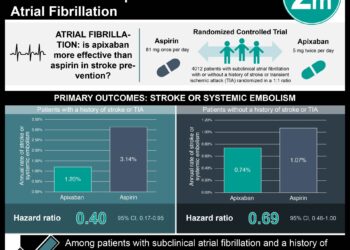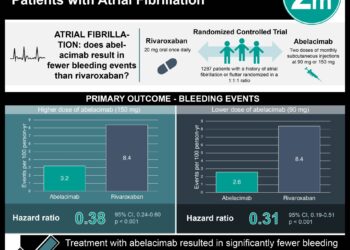Sleep disorders and insomnia may be strongly associated with atrial fibrillation
1. In this large population-based retrospective cohort study, patients with sleep disorders versus a cohort-matched control group were found to have an increased likelihood of also developing atrial fibrillation.
2. In sub-group analysis, insomnia was found to be associated with a greater incidence of atrial fibrillation among other sleep disorders (sleep apnea, sleep disturbance, and other sleep disorders)
Evidence Rating Level: 2 (Good)
Atrial fibrillation (AF), the most common cardiac arrhythmia, is associated with poor quality life and an increased risk of death. Past literature has highlighted an association between sleep apnea and cardiovascular disease and stroke, among other diseases. Unfortunately, past studies in the association of AF and sleep disorders have been conflicting. This study provided aimed to strengthen the inference of an association between AF and sleep disorders.
The study used a national health insurance database of Taiwanese residents. Residents aged 18 or older with a diagnosis of sleep apnea, insomnia, sleep disturbance or other sleep disorder between January 2001 and December 2012 were included. Individuals with a previous diagnosis of AF were excluded. The cohort was then matched by age and gender for a control group, and analyses was controlled for possible confounding diseases and medications. The primary outcome of the study was to determine the incidence rate of AF in sleep disorder cohorts.
The study identified 193 288 individuals with a sleep disorder diagnosis. The overall incidence rate of AF in the sleep disorder group was 1.35 times greater than control. Subgroup analyses revealed significantly higher incidence of AF in insomnia patients as opposed to sleep apnea, sleep disturbances, and other sleep disorders. These findings were consistent across all age categories. Medications with potential protective factors (including metformin, statins, and aspirin) and showed little effect. Interestingly, study findings from this large database study support an association with sleep disturbances and AF. However, this study was limited by its lack of adjusting for risk factors of AF, including: 1) obesity; 2) heart disease; 3) alcohol consumption. There was also a lack of objective data on sleep disturbances using polysomnography. Nonetheless, this study’s large sample size provides strong evidence of the association between sleep disturbances and AF.
Click to read the study in Sleep Medicine
Image: PD
©2022 2 Minute Medicine, Inc. All rights reserved. No works may be reproduced without expressed written consent from 2 Minute Medicine, Inc. Inquire about licensing here. No article should be construed as medical advice and is not intended as such by the authors or by 2 Minute Medicine, Inc.





![The ABCD2 score: Risk of stroke after Transient Ischemic Attack (TIA) [Classics Series]](https://www.2minutemedicine.com/wp-content/uploads/2013/05/web-cover-classics-with-logo-medicine-BW-small-jpg-75x75.jpg)

